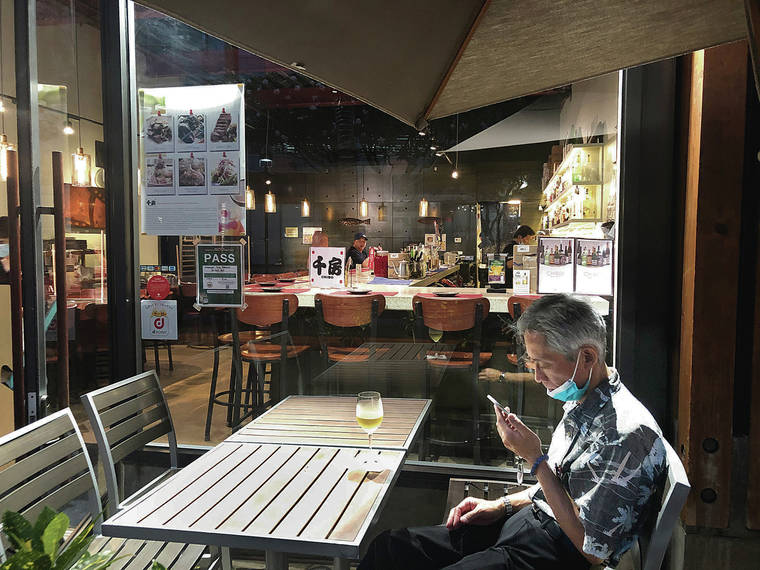Honolulu Mayor Kirk Caldwell adds $25M to small-business grant program


GEORGE F. LEE / JUNE 8
Honolulu Mayor Kirk Caldwell is adding another $25 million to a grant program to help small businesses affected by the COVID-19 pandemic. A lone diner sits outside of Okonomiyaki Chibo Restaurant on Beachwalk Avenue after Honolulu reopened its restaurants.


Honolulu Mayor Kirk Caldwell is adding another $25 million to a grant program developed by the city to help small businesses financially affected by the COVID-19 pandemic.
The money, which is part of nearly $400 million in federal CARES Act funds the city needs to expend by year’s end, is being distributed by local credit unions through the City and County of Honolulu’s Small Business Relief and Recovery Program. Applications will be available at noon today at oneoahu.org Opens in a new tab. Those already submitted will be held in queue by the servicing credit union.
“We have to help our small businesses stay in business,” Caldwell said. “They are the basic infrastructure of our economy. We need to preserve this infrastructure as we open up, otherwise there will be nothing to open up into.”
The program, which started May 18, offered one-time grants of up to $10,000 to qualified small businesses. The additional $25 million will be used to continue serv- icing those businesses, though the program has been loosened to allow for more to qualify.
The city already has distributed grants of more than $20 million, averaging around $7,500 each, to 2,662 recipients. The remainder of those funds is expected to be expended by the end of the week.
“This is a very timely point to have the mayor add this new $25 million,” said Ed Hawkins, executive director of the Office of Economic Development. The grant helps small businesses pay for new safety infrastructure to operate in the era of COVID-19.
Don't miss out on what's happening!
Stay in touch with breaking news, as it happens, conveniently in your email inbox. It's FREE!
The initial program included businesses with 30 or fewer employees and less than $1 million in gross annual revenue, but the new requirements allow for those with 50 or fewer workers and less than $2 million.
“We think that that’s going to add maybe 500 to 1,000 more potential applicants,” Hawkins said.
The city is being careful to spread out the use of the funds, Caldwell said.
“We want to make sure that there’s money there as we go forward. We do think that this fall could be difficult,” Caldwell said. “As (the federal Paycheck Protection Program) runs out, as unemployment insurance runs out, we hope to see visitors come back. But we probably know it’s not going to be a huge number, and we need that to grow in order to really get our economy humming again. There’s going to be a need out there.”
Hawaii recorded four new coronavirus cases Opens in a new tab Tuesday — all on Oahu — raising the statewide total of infections since the start of the outbreak to 740.
The state’s count of new COVID-19 cases so far in June already has doubled the total new cases recorded in May. There are 86 active infections and 637 patients now considered recovered since the start of the outbreak in February. The state’s coronavirus death toll remains unchanged at 17.
Of the more than 63,243 coronavirus tests conducted so far by state and clinical laboratories, about 1.2% have been positive. Hawaii has seen an upsurge in cases in June after a relatively mild May. So far this month, there have been 91 new confirmed cases, compared with 45 for all of May.
On Monday state Health Director Bruce Anderson said a patient tested positive for the new coronavirus at Hale Nani Rehabilitation and Nursing Center in Makiki — the first nursing home patient or assisted-living resident known to have contracted the disease. It was the fourth infection at a long-term care facility this month, but the previous cases were employees.
Wahiawa General Hospital said it was notified Tuesday that one of its staff members tested positive for the coronavirus. The employee is not involved in direct patient care, and the “risk of additional exposure is minimal,” said CEO Brian Cunningham.
“Unfortunately, even with the most stringent safety measures and guidelines in place, more cases are likely to occur on-island,” he said. “As anticipated, with the gradual reopening of our economy, Hawaii has seen an uptick in COVID-19-positive cases. Although the overall COVID-19 infection counts across the state remain relatively low, the potential for the further spread of this disease remains high.”
Sherry Menor-McNamara, president and CEO of the Chamber of Commerce Hawaii, said businesses are suffering. Half of the businesses surveyed by the organization in March already shut their doors — temporarily or permanently — due to a drop in business as residents followed the government’s stay-at-home orders and tourism dried up.
“As you can imagine, three months later the extent of the impact has escalated. It went from, back in March, to concern, and now it’s raised to desperation,” she said. “What we don’t want is our small businesses to close, because that will forever change the landscape and the fabric of our communities … and more importantly, the loss of jobs.”



